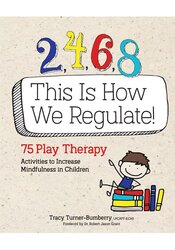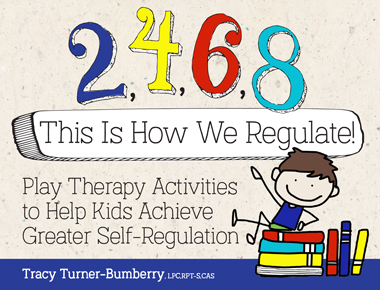Play Therapy Activities to Help Kids Achieve Greater Self-Regulation
Interventions based in Play Therapy and Mindfulness to understand and improve the world of children

What is more joyful than a child engaging in play?
Play is a child’s natural language and so often expresses what words simply cannot. Play allows a child to be in the present, fully immersed in the task at hand. Mindfulness is a sharp focus on the present moment, being attentive yet non-judgmental. What better way for a child to experience mindfulness than through play?
Imagine young Johnny visiting a therapist’s office for the first time. He isn’t sure why he has to be there, although he does know that many people in his life are making him mad. His mom has said that this counselor will help him with his anger, so he thinks it can’t be all that bad. Johnny arrives at the counselor’s office, which consists of a room, a couch, two chairs, and various (boring to Johnny) décor. The counselor introduces herself and then begins asking Johnny about his anger, his anger triggers, his coping mechanisms, etc.
How responsive do you think Johnny would be to these questions? Do you believe Johnny would feel comfortable sharing his experiences with this counselor—an adult he has just met? Do you think Johnny even has the words to fully express what he is feeling? As an adult, how often have you had difficulty finding the right words to fully explain your challenging experiences?
Now imagine Johnny visiting a play therapist’s office for the first time. He, again, isn’t sure why he has to go there, but people are still making him as mad as ever! His mom repeats that this counselor will help him with his anger, so he decided to give it another go. He arrives at the counselor’s office, but this time he enters a colorful room filled with toys! The counselor introduces herself and invites Johnny to explore the room and play with whatever he wants. She engages with him, laughs with him, and actually plays with him! He goes right to the swords, and boy does it feel good to slam these swords into a punching bag! He can feel intense feelings rising, then dissolving the more he hits the bag with the sword. This session is fun!
What do you believe has been Johnny’s experience this time? Do you believe he is comfortable with this therapist? Do you believe he will want to return? Do you believe that at this very first session Johnny experienced some healing without having to articulate his issue?
Play is considered to be the child’s natural language to promote insight and healing.
Children play what they know, and their play can help therapists more fully understand the world of the child.
There are enormous benefits to using play therapy with children of all ages. These include helping clients to:
- Become more responsible for behaviors and develop more successful strategies
- Develop new and creative solutions to problems
- Develop respect and acceptance of self and others
- Learn to experience and express emotion
- Cultivate empathy and respect for the thoughts and feelings of others
- Learn new social skills and relational skills with family
- Develop self-efficacy and thus a better assuredness about their abilities
There is not a one-size-fits-all approach for any therapist working with children. Accept that you, as a therapist, have your own unique and personal style and conduct your play therapy sessions in the way that feels the most genuine to you! Please feel free to modify these interventions to whatever works for you and your clients.
=========
Mantra Breath
Most children can easily think up a word as their mantra, but having a variety of pictures of faces, places and things can be helpful for those children who have language difficulties. Have index cards and markers handy to decorate the child’s words!
MATERIALS: Pictures of faces, places, and things; index cards; markers or crayons are needed for this intervention.
INSTRUCTIONS:
- Close your eyes.
- Think of something positive you needed to feel or experience this week.
- Quick! Pick the first word that came to your head and share.
- Write your word on the index card, then fill the card however you wish with markers.
- Hold your card, and breathe in slowly.
- Feel the word traveling in you!
- Turn the card over, and quietly blow out any stress onto the blank side. Try to blow out a few seconds longer than you breath in.
- Repeat this three to four times.
=========
Feelings Dance
Dancing can be fun and cathartic, and focusing on feelings while dancing can help illuminate even more how they feel in clients’ bodies. It is also informative to see movements clients show that relate to their feelings. It helps get a better view of your client outside of the therapy room.
MATERIALS: No materials are needed for this activity.
INSTRUCTIONS:
- Music can be an excellent coping skill to help us regulate our emotions. It can also feel so good to move our bodies to the music we enjoy!
- Today I get to learn more about you and what music you like. We can talk about different feels you have felt lately and then choose moves that remind you of these feelings.
- Can you name a feeling that you have felt lately? (Client names one.) Let’s think about that feeling. What does (happy, sad, mad, scared, etc.) feel like in your body?
- If that feeling had a body, how do you think it would move? Let’s move our bodies how we think (happy, sad, mad, scared, etc.) would move. (This activity can be repeated for a second, third, and fourth feeling.)
- Did you notice any differences in how you moved depending on which feeling was moving? Tell me more about that. I wonder if we move differently when we feel different feelings. What do you think? Do you suppose that we could modify how we are feeling by moving in a different way? Maybe we can investigate that in the next week and see!
Want the whole collection of exercises and worksheets?

Order your copy of 2, 4, 6, 8 This Is How We Regulate: 75 Play Therapy Activities to Increase Mindfulness in Children and use code 2468BLOG to receive 20% off this best-selling resource.
Don't forget to use code 2468BLOG for 20% off
Don't forget to use code 2468BLOG for 20% off
Meet the Expert:
Tracy Turner-Bumberry, LPC, RPT-S, CAS , is the owner/operator of KS Counseling, LLC. Tracy is a Licensed Professional Counselor, a Registered Play Therapist-Supervisor, a Certified AutPlay Therapist/Trainer, and a Certified Autism Specialist. She has over twenty years of experience working with children, adolescents, and young adults. Tracy has been in private practice since 2009. Prior to working in private practice, Tracy worked as a high school teacher and an elementary school counselor. She is an expert at interpreting and explaining school procedures and documents to parents, especially in the area of Individual Educational Programs (IEP’s). In addition to her private practice, Tracy is a certified AutPlay Trainer, and conducts Play Therapy workshops across the country.
Learn more about her educational products, including her upcoming live seminars, by clicking here.
Learn more about her educational products, including her upcoming live seminars, by clicking here.



